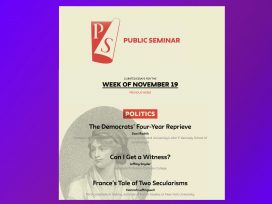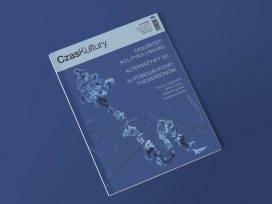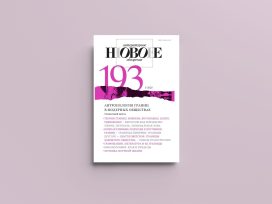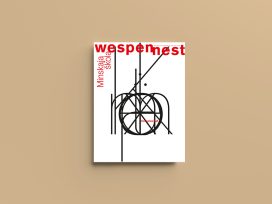‘Vagant’ heralds writing that moves staid positions on the welfare state: freelance writer Henning Hagerup exposes Norway’s bureaucratic system; Christian Johannes Idskov notes the literary excellence and fated criminality of second-generation migrant Hassan; and Joni Hyvönen asks, Ken Loach: tragedian or saboteur?
Up with degrowth
Czas Kultury 3/2020
Literature that bridges the welfare gap
Vagant 1/2020
Subscribe to our weekly newsletter
Vagant’s epigraph for its dossier on socio-political concerns is a quote from Henning Hagerup’s essay about being a social service client: ‘In today’s welfare state, you have to fight to retain a sense of dignity’. The issue introduces articles dealing with the decline of social democracy as a political force and a concurrent bureaucratization of state welfare systems in Europe.One outcome of this direction is ‘the growth of a new unorganised underclass [the precariat]; its recruits can’t count on a minimum wages or sick pay, and as a rule have no fixed assets.’ As Thomas Piketty points out in Capital et idéologie, ‘access to a free market is not a credible compensation’. But the editorial ends on a hopeful note: ‘if we are to expect something more’ than minimal security ‘from the welfare state, we must create a space for airing new ideas. History tells us that when literature truly moves its readers, political debate can be fired up and won.’
Henning Hagerup, the writer
Henning Hagerup, a self-declared member of the urban precariat, describes the effects of severe illness and accumulating debt on his long, successful existence as a freelance writer. In the end, he has to depend on handouts from Norway’s social care organisation. Grateful but frustrated, he writes: ‘Without gifts of money from friends, criminality was something we had to consider seriously.’ The welfare system ‘makes you an anonymous item in a collective, in a society where the ideology of individualism has become a raging storm.’ You are not allowed to sit back: ‘you must stick to hectic, impoverished activity’ with ‘outcomes so bizarre that you would’ve laughed if you could afford to.’
Yahya Hassan, the poet
Christian Johannes Idskov writes a valedictory to Hassan, who died at 24 years of age and regrets that ‘Hassan’s story is not only about the young delinquent who became the country’s best-selling poet’ but also ‘about an impotent welfare system.’ Hassan, a second-generation Palestinian immigrant, rebelled as much against his sub-criminal family as against social conditions.
‘His debut collection is a social journey’ allowing us insight into ‘the small mesh net of residential homes, borstals, supervisors, youth prisons, piss tests and pedagogues that catches lost young people.’ Hassan’s journey may have brought literary and media success but it also led to prison for drug-related crimes: ‘So the public’s worst suspicions were confirmed – take the boy out of the ghetto but no one can take the ghetto out of the boy. Hassan clearly knew, even in his debut collection, that his fate was sealed.’
Ken Loach, the Tragedian
Joni Hyvönen’s analytical filmography of Ken Loach’s work points to his social conscience as well as his compassion: ‘His characters are for ever stuck in the same place; [Loach] has no illusions that the state can make us better people … rather, his films – often based on real events – show that state security is the most deceptive form of safety.’
But after citing the anthropologist David Graeber’s Bullshit Jobs: A Theory, which insists that ‘a puritan ethic dominates our current understanding of work’ and that work is seen as ‘unending activity for its own sake rather than meaningful tasks’, Hyvönen argues that Loach’s films tell us more about people in trouble than policy priorities: Loach ‘is primarily a tragedian rather than the political film maker he is usually portrayed as: a kitchen sink realist but in the spirit of Aeschylus and Sophocles, a teller of tragic stories for British left-of-centre politicos, a class analyst with the mind of a saboteur.’
This article is part of the 20/2020 Eurozine review. Click here to subscribe to our weekly newsletter to get updates on reviews and our latest publishing.
Published 19 November 2020
Original in English
First published by Eurozine
Contributed by Vagant © Eurozine
PDF/PRINTNewsletter
Subscribe to know what’s worth thinking about.
Related Articles
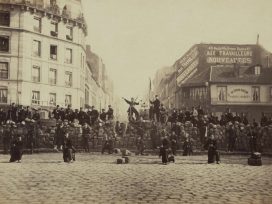
Debate around the cultural sector’s structural inequality often ignores issues of class. Yet behind the success of many practising artists lies an inheritance, allowance or other class privilege. Eight portraits of Belgian artists seek literary revenge, breaking into cultural capital’s invisible economy.

Growing reluctance to engage with books is endangering democracy and science. Deep reading boosts the human capacity for abstract and analytical thinking, protecting us from the corrosive effects of bias, prejudice and conspiracy theories.
